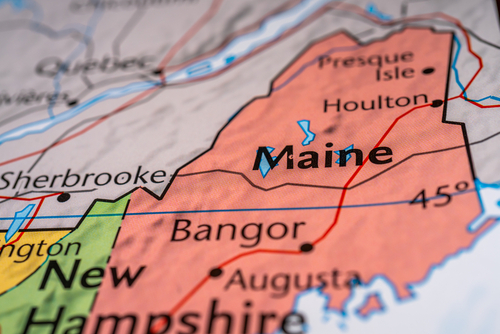
In today’s increasingly complex and interconnected business world, the range of career paths for accounting professionals are as numerous and diverse as these professionals themselves. Top-rated business schools in the Pine Tree State are preparing their graduates through several versatile and accredited accounting degree programs. Those planning to pursue a master’s level accounting degree have options ranging from brick-and-mortar campuses, online study or a blend of both. The University of Maine and Southern Maine University are two institutions leading the way in preparing Maine’s accounting professionals for knowledgeable and ethical leadership in New England and beyond.
University of Maine
The University of Maine is ranked by the U.S. News and World Report among the top 200 universities nationwide. It’s the state’s flagship public university and one the country’s top universities for research. The university has a long and rich history. It was established in 1865 under a land-grant act signed by President Abraham Lincoln. Its campus is located on the banks of the Stillwater River. It has a student body of about 9,000 undergraduates and 2,250 graduate students. They enjoy the nearby Bangor, Maine’s third largest city, as well as the natural beauty of one of the Northeast’s largest remaining stretches of undeveloped forests and lakes.
The Maine Business School
The Maine Business School is noted by the U.S. News and World Report as one of the country’s best. The School’s programs and curricula emphasize both business skills and ethical behavior. The goal is to prepare graduates for leadership in their own communities as well as success in today’s global economy. Faculty are nationally and internationally recognized for their expertise. Many serve or have served as CEOs and board directors for various companies and organizations.
Master of Business Administration in Accounting
The University of Maine’s Accounting MBA is a standout not only for its quality curriculum but also for its flexibility and versatility. The program prepares graduates for success in a range of positions and career paths, from government agencies to small business ownership. In addition to an 18-credit core, each degree candidate chooses 12 additional credits from a pool of accounting electives. These can be tailored to individual interests and goals. Options include:
- tax planning for small businesses
- international accounting
- an accounting field practicum
The program is flexible not only in its coursework and career outcomes, but also in its scheduling and educational format. The program is offered in a blended format, with some classes available online and others offered live in the classroom. All MBA core courses are offered online, but students will still have the option of attending some on campus. This blended format makes the program ideal for working professionals seeking to balance careers with graduate-level education.
Regardless of whether classes are taken online, on campus or through a combination of both, the learning outcomes in the University of Maine’s Accounting MBA are the same. Core competencies as defined the School include:
- problem-solving
- communication
- teamwork and leadership
- experiential learning
- diversity
- responsibility
Accreditations
- New England Association of Schools and Colleges
- Association to Advance Collegiate Schools of Business (AACSB International)
Contact
The Maine Business School
5723 D.P. Corbett Business Building
Orono, ME 04469
Phone number: (207) 581-1968
Email: dangelo@maine.edu
Website: http://umaine.edu/business/degrees-and-programs/mba/graduate-programs/the-accounting-mba/
University of Southern Maine
School of Business
The School of Business offers career-oriented students the educational opportunities and real-world experience needed for success and leadership roles in today’s business community. These students can be:
- traditionally aged, full-time students
- working professionals seeking a degree to further their career
- somewhere in between
Students work with noted faculty and with New England business partners as they learn through:
- research
- professional service
- academic studies
Master of Business Administration in Accounting
The School of Business’s MBA in Business Administration, Accounting Concentration prepares graduates for the complex range of responsibilities and services undertaken by today’s accounting professionals. Degree candidates complete all of the core coursework required by the general MBA program. Topics include:
- organization change
- ethics and legal issues in business
- information systems
- international business
- marketing
- operations analysis
Students then choose three electives from the accounting concentration to deepen their knowledge of the field and profession. Course options include:
- management
- tax policy
- current issues in accounting
The University of Southern Maine’s MBA programs are primarily designed for working professionals. They’re structured for completion through part-time studies. However, the program of study can also accommodate those who choose to attend school on a full-time basis. Evening and summer classes are offered for even greater flexibility in completing the degree.
Accreditations
- Commission on Institutions of Higher Education of the New England Association of Schools and Colleges
- Association to Advance Collegiate Schools of Business (AACSB)
Contact
113 Luther Bonney, Portland Campus
96 Falmouth Street
Portland, ME 04103
Phone number: (207) 780-4020
E-mail: sbinfo@usm.maine.edu
Current or aspiring accounting professionals today have varied academic, career and personal goals. Accredited accounting degree programs in Maine, such as the two outlined are above, may be the right next step in pursuing those goals.
Related Resources:
- What Is The Expected Salary for Someone with a Master’s in Finance Degree?
- What is the Difference Between a Master of Finance and an MBA?
- What is the Difference Between a Master’s in Finance and a Master’s in Accounting?
- What is the Difference Between a Master’s in Finance and a Master’s in Economics?
